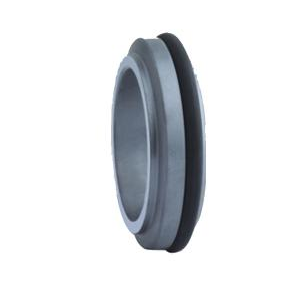Understanding the Mechanical Seal Stationary Seat: A Key Component for Leak Prevention
2025-03-04
In many industrial applications, particularly in pumps, compressors, and other rotating equipment, ensuring a tight seal is crucial to prevent leaks and maintain efficiency. One of the key components in achieving this seal is the mechanical seal stationary seat. Though often overlooked, the stationary seat plays a vital role in the overall performance of a mechanical seal system. In this blog, we will explore the importance of the mechanical seal stationary seat, its functions, and why it is indispensable in various industries.
What is a Mechanical Seal Stationary Seat?
The mechanical seal stationary seat is part of the mechanical seal assembly, typically used in pumps and rotating machinery to prevent the leakage of fluids. It serves as the component that holds the stationary part of the mechanical seal in place. The stationary seal is typically made from durable materials such as ceramics, carbon, or metal, and it forms a crucial part of the sealing system. The stationary seat provides a stable and secure environment for the seal, ensuring that it performs as intended and maintains the necessary pressure to prevent leaks.
Functions of the Mechanical Seal Stationary Seat
1. Support for the Seal Face: The mechanical seal stationary seat provides support to the stationary seal face, which is one of the primary surfaces that come into contact with the rotating seal face. This support is critical for maintaining the proper alignment of the seal, which directly influences the performance and longevity of the mechanical seal.
2. Pressure Containment: The stationary seat helps contain the pressure within the sealing area by maintaining the correct gap between the rotating and stationary faces of the seal. This pressure containment is vital for ensuring that the mechanical seal can withstand high pressures and prevent fluid leakage, which could otherwise lead to operational failures or safety hazards.
3. Heat Dissipation: In many applications, the friction between the sealing faces can generate heat. The stationary seat plays a role in dissipating this heat, helping to prevent overheating of the seal. This heat management is particularly important in high-speed and high-pressure applications where excessive heat can cause wear and failure of the seal.
4. Protection Against Corrosion and Wear: Given that the stationary seat is typically in direct contact with the fluid being sealed, it is designed to withstand corrosion, abrasion, and wear from the chemicals or substances it is exposed to. Many stationary seats are made from materials like ceramic or special alloys that offer excellent resistance to corrosion and wear, extending the life of the mechanical seal.
Types of Mechanical Seal Stationary Seats
Mechanical seal stationary seats can be made from various materials depending on the application and the type of fluid being sealed. The material selection is crucial for ensuring the longevity and performance of the mechanical seal. Some common materials used for stationary seats include:
- Ceramics: Ceramic stationary seats are highly resistant to abrasion and wear, making them ideal for applications involving abrasive fluids or high pressures. They also have excellent thermal conductivity, which helps with heat dissipation.
- Carbon: Carbon is another popular material used for stationary seats, particularly in applications involving low to moderate pressures and temperatures. It offers excellent resistance to chemical corrosion and is often used in sealing systems for oils, water, and other non-abrasive fluids.
- Metal Alloys: For applications involving high temperatures or aggressive chemicals, metal alloys such as stainless steel or Hastelloy are used for stationary seats. These materials provide high strength and resistance to both thermal and chemical degradation.
Applications of Mechanical Seal Stationary Seats
Mechanical seal stationary seats are used in a wide range of industries, including:
- Chemical Processing: In chemical plants, where various fluids and gases are handled, mechanical seal stationary seats are used to prevent leaks of potentially hazardous substances. Their ability to withstand harsh chemicals and high pressures makes them essential in maintaining the safety and efficiency of the plant.
- Oil and Gas: In the oil and gas industry, mechanical seals are critical for preventing leakage in drilling equipment, pipelines, and pumps. The stationary seat plays a key role in ensuring that high-pressure environments do not result in fluid spills or leaks that could lead to operational disruptions or environmental hazards.
- Water and Wastewater Treatment: In water treatment plants and wastewater processing facilities, mechanical seal stationary seats help to keep water or chemicals contained during treatment processes. These seals are crucial for maintaining environmental safety and regulatory compliance.
- Pumping Systems: Pumps in various industries, from manufacturing to food processing, rely on mechanical seals with stationary seats to ensure that the fluids being pumped do not leak into the environment. The stationary seat helps maintain the pressure and seal integrity within the pump, ensuring continuous operation.
Why is the Mechanical Seal Stationary Seat Important?
The mechanical seal stationary seat is a critical component that impacts the overall reliability and longevity of mechanical seal systems. Without a properly functioning stationary seat, the entire sealing system can fail, leading to costly repairs, downtime, and potential safety hazards. Proper maintenance and selection of the correct stationary seat material for a given application are key factors in ensuring optimal seal performance.
Furthermore, as industries continue to push the boundaries of operational efficiency, the demand for high-performance seals and stationary seats increases. Innovations in materials and design continue to enhance the performance of mechanical seals, making them even more durable and efficient in challenging environments.
Conclusion
In conclusion, while often an overlooked component, the mechanical seal stationary seat is indispensable in ensuring the reliability and efficiency of mechanical seals. Its role in providing support, maintaining pressure containment, dissipating heat, and protecting against wear and corrosion makes it a critical part of sealing systems in various industries. Choosing the right material and ensuring proper maintenance of the stationary seat can significantly extend the lifespan of the mechanical seal and prevent costly failures. Whether in chemical processing, oil and gas, or water treatment, the stationary seat helps ensure that mechanical seals continue to perform at their best, safeguarding both operations and the environment.



